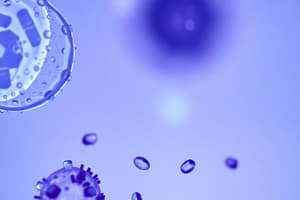Podcast
Questions and Answers
Cell biology is a crucial subtopic of _________, focusing on the study of cell structure and function.
Cell biology is a crucial subtopic of _________, focusing on the study of cell structure and function.
biology
Understanding cell biology provides insights into various biological phenomena, ranging from the intricate functions of individual cells to the organization of __________ organisms and entire ecosystems.
Understanding cell biology provides insights into various biological phenomena, ranging from the intricate functions of individual cells to the organization of __________ organisms and entire ecosystems.
multicellular
Cell biology is vital for comprehending the structure, function, and interactions of cells, which in turn facilitates the discovery of treatments for diseases such as ________ and AIDS.
Cell biology is vital for comprehending the structure, function, and interactions of cells, which in turn facilitates the discovery of treatments for diseases such as ________ and AIDS.
cancer
Research in cell biology employs multiple techniques, including cell culture, fluorescence microscopy, phase-contrast microscopy, confocal microscopy, transmission electron microscopy, and ________.
Research in cell biology employs multiple techniques, including cell culture, fluorescence microscopy, phase-contrast microscopy, confocal microscopy, transmission electron microscopy, and ________.
There are two main types of cells: prokaryotic and ________.
There are two main types of cells: prokaryotic and ________.
Prokaryotic cells lack a nucleus and other membrane-bound organelles, characterizing ________ and archaea.
Prokaryotic cells lack a nucleus and other membrane-bound organelles, characterizing ________ and archaea.
Prokaryotic cells have a membrane-bound nucleus.
Prokaryotic cells have a membrane-bound nucleus.
Eukaryotic cells are typically larger than prokaryotic cells.
Eukaryotic cells are typically larger than prokaryotic cells.
Cell biology is focused on the study of cell structure, function, and behavior.
Cell biology is focused on the study of cell structure, function, and behavior.
Cells are not essential to comprehend biological processes.
Cells are not essential to comprehend biological processes.
Cytology is another term for molecular biology.
Cytology is another term for molecular biology.
Cell types can be classified into three categories: eukaryotic, prokaryotic, and archaea.
Cell types can be classified into three categories: eukaryotic, prokaryotic, and archaea.
Eukaryotic cells contain a membrane-bound nucleus and lack membrane-bound organelles.
Eukaryotic cells contain a membrane-bound nucleus and lack membrane-bound organelles.
Prokaryotic cells typically have a single circular chromosome and no nucleus.
Prokaryotic cells typically have a single circular chromosome and no nucleus.
Mitochondria are responsible for energy production in eukaryotic cells.
Mitochondria are responsible for energy production in eukaryotic cells.
Prokaryotic cells have a variety of membrane-bound organelles.
Prokaryotic cells have a variety of membrane-bound organelles.
The cytoskeleton is responsible for maintaining cell shape in both prokaryotic and eukaryotic cells.
The cytoskeleton is responsible for maintaining cell shape in both prokaryotic and eukaryotic cells.
Fluorescence labeling is a technique commonly used in cell biology to visualize cellular structures.
Fluorescence labeling is a technique commonly used in cell biology to visualize cellular structures.
Study Notes
Introduction
Cell biology is a crucial subtopic of biology, focusing on the study of cell structure and function. Specifically, it examines how cells form, divide, and differentiate, elucidating the processes that occur within and around cells. Understanding cell biology provides insights into various biological phenomena, ranging from the intricate functions of individual cells to the organization of multicellular organisms and entire ecosystems.
The Importance of Cell Biology
Cell biology is vital for comprehending the structure, function, and interactions of cells, which in turn facilitates the discovery of treatments for diseases such as cancer and AIDS. It also plays a key role in understanding the complex interactions between cells, enabling researchers to develop strategies for protecting the planet and addressing challenges such as climate change.
Studying Cells
Research in cell biology employs multiple techniques, including cell culture, fluorescence microscopy, phase-contrast microscopy, confocal microscopy, transmission electron microscopy, and cytometry. These techniques enable scientists to observe cell architecture at varying scales and reveal details that would otherwise remain hidden.
Types of Cells
There are two main types of cells: prokaryotic and eukaryotic. Prokaryotic cells, which lack a nucleus and other membrane-bound organelles, characterize bacteria and archaea. In contrast, eukaryotic cells, found in plants, animals, fungi, and protists, have membrane-bound organelles like nuclei and are significantly larger.
Cellular Processes
Cell biology encompasses various subtopics within the study of cells. These include cell metabolism, cell communication, cell cycle, biochemistry, and cell composition. Studying these processes helps scientists understand how cells function, ultimately providing insights into the physiological and ecological roles of living organisms.
In conclusion, cell biology is a fundamental aspect of modern biological research, enabling scientists to delve deeper into the complexities of life and uncover new discoveries about the world around us.
Studying That Suits You
Use AI to generate personalized quizzes and flashcards to suit your learning preferences.
Description
Explore the foundational concepts of cell biology, including the structure, function, and processes of cells. Learn about the importance of cell biology in disease research, environmental protection, and understanding life on Earth.




